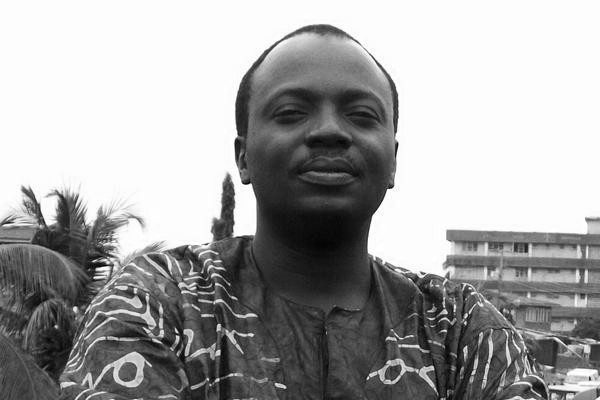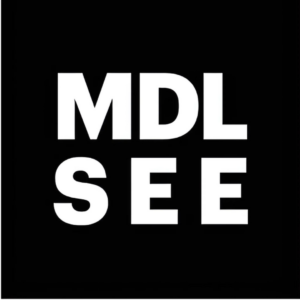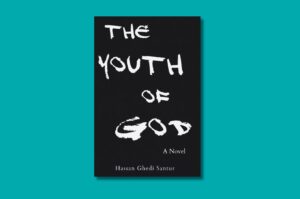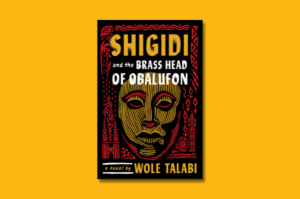Tade Ipadeola is one of three authors in line to win the 100,000 dollar NLNG prize for Poetry. Enjoy this thoughtful and revealing conversation between the prize winning poet and Uche Umez who was shortlisted for the NLNG literature prize in 2007 and 2011. Both poets reflect on everything from the Arab Spring, poetic style/composition, Seamus Heaney, to Ipadeola’s shortlisted poetry collection, The Sahara Testaments.
Follow Tade Ipadeola @tadepen

Uche Umez: The Sahara Testaments appears to be the largest volume of poetry by a Nigerian I have read in recent times. 184 pages. How long did it take you to write such an impressive volume? Was there a point when you thought it wasn’t worth completing and had to give up?
Tade Ipadeola: I’m sure there are larger volumes of poetry out there. The thing with poetry though, is that size means nothing if there is no substance to it. People study Elizabeth Browning’s incredibly long poem, Aurora Leigh, as well as the really slim Goblin Market by Christina Rosetti. The actual writing of The Sahara Testaments took about four years, although the material had been gathering in my mind since 2003. I set myself a target of a thousand quatrains on the Sahara. I alsmost stopped at the halfway mark when I began to question the arbitrary figure of a thousand quatrains. Can one set out to write one thousand megabites of poetry? What does that kind of objective imply? The Sahara is really large though, and infinitely engaging. There is always new material to write on.
Umez: Seamus Heaney said, “it was the voltage of language” that pulled him into poetry. What would you say drew you to poetry, considering that you are a practising lawyer? How did you discover poetry?
Ipadeola: My family, I think, in the final analysis, accounts for my inclination towards writing. I learnt to respect aesthetic speech from my late grandmother. She could really shape language into the quaintest forms. My father studied and taught literature all his life. He taught at Fiditi Grammar School after Christopher Okigbo and retired as a school principal in my village school. My mother taught language in school, English and Yoruba. I always wrote. I was one of the school essayists in my secondary school. In my final year in secondary school, I won a regional prize worth N50.00 then. I discovered poetry for myself at the university. I haven’t looked back since. It was like discovering trigonometry on your own when all you were ever formally taught was arithmetic and surds.
Umez: Accomplished as your poetry is, it lends itself to certain degrees of exclusivity such that only those who have a predilection for eclectic reading can appreciate what you have achieved in The Sahara Testaments. Where do you think your style of writing comes from? Do you see yourself as a poet who writes for poets only, a kind of poet’s poet? Don’t you feel concerned that non-poets will find your poetry rather too daunting to engage with?
Ipadeola: There is enough variety in Nigerian poetry to choose from. There is the marketplace poetry of the ’80s, the vitriolic verse of the ’90s and the rattlebag of the early 21st century. Before all these we had Okigbo, J.P Clark and Soyinka in the ’60s and Odia Ofeimun, Osofisan and Chinweizu in the ’70s. There is something for everyone. Poets like Niran Okewole, Tolu Oloruntoba and Uzo Dibia, medical doctors all, write a kind of poetry that is visceral and cerebral all at once while maintaining their medical registers. I write for those who like to be challenged. I read challenging poets. I read Okigbo and Stevens. I read Aeschylus and Homer. I read Heaney and Walcott. I read Muldoon. These are all challenging poets in their own right. When you really think about it, there is no simple poetry anywhere. You won’t find it in Olu Oguibe, you won’t find it in Afam Akeh and you won’t find it in Joseph Ushie. When you find simple astronomy you’ll find simple poetry. There is no such thing.
Umez: In Chapter iii, vi of “First Breath”, I was thinking of the Arab Spring and the unabated unrest and violence in Egypt, and then these lines rattled me:
As vultures settled to feast, their dislike
Or choice for Black or Arab flesh remained
Unclear.
Where you thinking of the issue of colorism in North Africa when you wrote these lines? Or did you bring in this haunting imagery to heighten the grimness of war?
Ipadeola: Both ends were in view, actually. War is tragedy at its starkest. I like to imagine that the souls of slain soldiers rise from the battlefields arm in arm regardless of which side they fought on, wondering why on earth they killed and maimed each other. There is a story of two soldiers who succeeded in mortally bayoneting each other in battle. Their mutual epiphanies came even as breath fled from both of them and they died as friends. Duty can be a path to hell at times. Again, it is undeniable that in many countries in Africa, from Mauritania to the Sudan, black Africans are endangered species. It is ironic in many ways, and dangerous. In 1960, there was not a single Arab officer in the Mauritanian army. Today, there isn’t. A single officer who is not Arab.
The active propagation of Arabisation isn’t a good thing for a multicultural Africa. The backlash may eventually cause upheavals that no world body is prepared to handle. It is an odd phenomenon in human nature that those who were recipients of human kindness when it mattered most sometimes become the most virulent misanthropes. As we speak, genocidal armies with helicopter gunships are raiding the Nuba mountains in Sudan and killing off black Africans. As we speak, Palestinians are stoking the fires of Intifadah against Israelis. It is gratifying to come across the works of scholars like Samir Amin who himself is part Arab and who has carefully documented the damage done by rabid Arabism in the Maghreb and the Tamazgha. The domino effect of decades of Arabisation is what you see in northern Nigeria today and in Salafist controlled Mali. So poetry remains a way to handle dangerous knowledge in the Sahara.
Umez: Poetry, Elizabeth Bishop writes in a letter to May Swenson, is “a way of thinking with one’s feelings. What feelings have lines like “The long line of bards of this land/Fear nothing except perdition/They have suffered war and privation/And so fear nothing of the planned/Retrenchment, retribution for their verse” provided you with?
Ipadeola: I go in fear of definitions of poetry, especially when those are coming from poets I respect like Elizabeth Bishop. There is a way those definitions, whether it is Wordsworth own ‘spontaneous emotions recalled intranquility’, or Osundare’s ‘man meaning to man’ embrace a specie of poetry while excluding other species. But back to the specific question you posed, I suppose my feelings are largely reflective of the loyalty I have pledged to the Republic of Imagination.
Umez: Free verse is the standard for many Nigerian poets. But the poems in The Sahara Testaments adhere to strict formal structure – besides, its impressive epic quality, nearly all the poems are in quatrains and rhymes. What attracted you to this approach? And can you describe your own experience of writing towards this particular form?
Ipadeola: It happened that the first four quatrains I wrote came in quatrains of alternating ab/ab lines. I didn’t plan it that way, it just came naturally. I did that for the first 500 or so quatrains before experimenting with the aa/bb format, then a couple of monorhymed quatrains and a few eye-rhymed quatrains. I did some half rhymes as well. You’ll notice the interlude/interval didn’t come rhymed. I didn’t want to be seen as writing to a formula. The Sahara has its own visual rhyme scheme, its own asymetric beauty, its own harsh and haunting aesthetic. I wanted the poetry to reflect some of that. What I noticed was that after a while, the writing just flowed in a natural stream. I had no paper dictionaries, just the digital dictionary on my phone.
Umez: A certain statement by T.S. Eliot came to mind while I was reading your collection, the one about the modern poet having to become “more and more comprehensive, more allusive, more indirect, in order to force, to dislocate if necessary, language into his meaning.” How would you respond to this statement? Is that the vision you strove to achieve with The Sahara Testaments?
Ipadeola: I have never been a fan of imperatives of writing whether it is Pound haranguing to ‘make it new’ or it is Eliot urging the ‘objective correlative’. But I agree that there is increasingly a demand for the poet to be more comprehensive. The human story is the story of gestalt aspirations. We are in danger though, of making meaning a function of learning. Learning helps but meaning can be achieved regardless of learning. I’ll tell you a little story to illustrate what I mean. While on youth service in Asaba, I lived in a house with other corpers at Cable Point. The house had a large shade tree under which were a beggar couple. The husband was blind and the wife was lame. They had a baby girl, an infant really, less than a year old at that time. I never once heard these two raise their voices at each other all through the year. The man had a beatific smile constantly on his face and so did the wife. People went out of their way to drop money in their begging bowl, a single bowl. They always seemed to whisper what nobody else could hear into each other’s ears and it seemed they smiled even more each time. Now, I wouldn’t have noticed their happiness were it not for the fact that I lived for a season at the university quarters and we had this couple, professors both, as neighbours. You have never seen a more clamorous household. How they even functioned as academics was a mystery to me.
Umez: I suppose you must have visited some of the North African countries you mentioned in The Sahara Testaments. Did you write some of the poems while you were outside Nigeria?
Ipadeola: I wrote the work for the most part in Nigeria. The rest I wrote during my travels. Sadly I couldn’t visit the countries in the eye of the Arab Spring storm, which, by the way, is yet to blow over.
Umez: History and geography play a significant function in your poetry, particularly in recreating the sense of ruin that marks most of ancient Africa. In Part iii, “Remnant Music”, the stanza below makes me feel that you used the Sahara not only as a motif but also as a reminder of the Sahara’s fate and what might befall most African countries, if they fail to be responsible to the masses. Was this part of your intention – to forewarn?
The wind changes course, piles its baggage
Over the burnt face of the Sahara, a coming storm
Murmurs distant truths liturgical as language
Warning travellers, with sound and form.
Ipadeola: The planet is in trouble. We are in trouble. No matter how we pretend, the earth is in distress. Some of the social displacement we have is due directly to desertification. The irony is that for the first time in human history we do have the knowledge, the capital and the technology to make the planet habitable and comfortable again. Does it take rocket science to realize we can re-create the mega-Chad and save ourselves the needless flooding killing hundreds and destroying property every year? Must we wait for the Europeans and the Asians to cultivate the sahel and arrest the galloping Sahara? I think not.
Umez: Finally, who are your favourite poets? Which poets have influenced you? What’s writing poetry like for you? And what is a poem to you?
Ipadeola: Derek Walcott and Paul Muldoon are still the ones I read most. I have since discovered Ian Duhig, Rachel Boast, Joel Toledo, Gen Asenjo, Gihan Omar, Rethabile Masilo, Lisa Combrinck, Chiedu Ezeanah, Niran Okewole, Biyi Olusolape, Michelle McGrane, Gebinyo Ogbowei and Amatoritsero Ede. There is a special poet who takes an opposite approach to my own who I really admire, Afam Akeh. Indeed, I couldn’t resist taking an epigraph for my own work from him. What Afam Akeh writes largely captures my conception of poetry. It is a form of mastery that is rendered with simplicity. It is really the height of sophistication, when you come to think of it.
Image Source:









Tade Ipadeola Talks to Uche Umez About His Poetry Collection The Sahara Testaments | Books LIVE October 21, 2013 08:33
[…] Complete interview: Brittle Paper […]